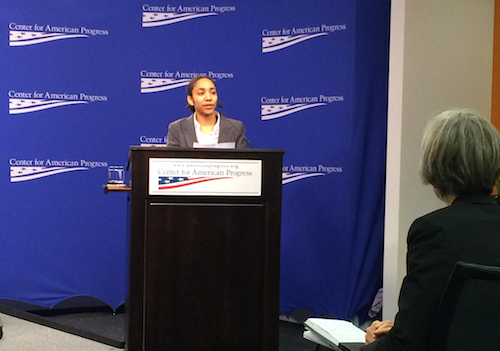Cary James’ story mirrors that of many young people. She did the things that are supposed to ensure someone a good job. She did well in school and went to college. But when James graduated, there weren’t any jobs in her field. It wasn’t until later that she discovered the building trades and their apprenticeship opportunities.
“Following my graduation from [Boston University], I spent quite a few years in a job that I knew wasn’t for me, that wasn’t related to my degree or what I wanted to do in life,” said James, who is a first year apprentice member of Washington, D.C., Local 26. “I realized that I needed to move away from a job and start looking for a career.”
James’ career move recently took her to the Center for American Progress, a think tank in Washington, D.C. She was a featured speaker at an event in February, “Investing in Our Nation’s Human Capital Through Apprenticeship,” that included former Kentucky Gov. Steve Beshear and experts on employment policy.

|
| District of Columbia, Local 26 apprentice Cary James speaks at an event sponsored by the Center for American Progress on the benefits of apprenticeship programs.
|
Event panelists and speakers discussed the benefits of apprenticeship as well as obstacles to getting more people involved. It also highlighted a new report on state-level attempts to promote such programs.
Apprenticeship programs are not new. But while they are a key means of employment and a solid way to the middle class in countries like Germany and Switzerland, they remain underutilized in the U.S. In 2015, less than half a percent of the American labor force was enrolled in an apprenticeship, said CAP.
With skyrocketing college tuition and the subsequent student debt crippling many millennials, along with the aftershocks of the Great Recession impacting youth employment, an apprenticeship could be a welcome change. Unlike internships, which are often unpaid and come with informal training, apprenticeships come with wages and benefits.
As the CAP report noted, employers pay up front for the programs but yield a solid return on their investment. Not only do they get a pipeline of skilled working men and women who are loyal to their sponsors, they get an average of $1.47 back for every dollar invested.
Apprenticeships are also good for the economy. A skilled workforce is a major selling point for businesses looking to relocate. Gov. Beshear said the No. 1 question he got from meetings with businesses was whether his state had a “well-trained, skilled workforce.”
In addition to state-level action, the Obama administration has dedicated $175 million for a grant initiative to encourage public-private partnerships that create more apprenticeship opportunities. The administration is also aiming to double the number of apprentices.
So why aren’t more people applying to apprenticeships? Gov. Beshear says a lot of it is attitude.
“There’s still this myth out there that this is shop class,” Beshear said of the implication that skilled labor is inferior to other educational training.
He says more people need to see what actually goes on inside today’s factories.
“All you’ve got to do these days is go in to any manufacturing unit … you don’t see sparks flying. You see people on computers. You see robotics,” he said.
One of the panelists, senior manager at MTU America Jeremy Diebel, runs a program geared toward high school students. He said that counselors frequently steer their students away from the trades, assuming college is the only worthwhile path. Yet considering the apprentice wages and lack of student debt, these counselors may need to take another look.
“What we offer is a path that … does not have to close any doors,” Diebel said. “We’re giving them a leg up.”
James says she wasn’t aware of IBEW’s apprenticeship in high school.
“More people should go into high schools and speak about these apprenticeships,” James said. “College isn't for everyone and this is another path that a lot of people would choose if they knew more about it.”
James is happy with her new career choice.
“I feel that becoming an electrician is the right career for me,” she said in her closing remarks. “I look forward to learning more about the technical aspects of the trade as I feel that’s where my future lies.”